How will government shut out the Trojan Horse?
- Published
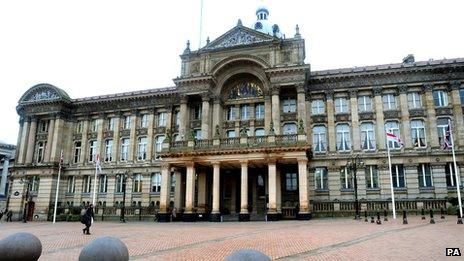
Birmingham City Council is investigating 25 schools about claims of takeovers
The government and Ofsted have produced an array of proposed changes to school governance after the publication of an inspection report on 21 Birmingham schools.
Ofsted found "a culture of fear and intimidation" had taken grip in schools at the centre of the so-called Trojan Horse allegations.
The inspections followed claims in an anonymous letter that hard-line Muslims were trying to impose their views on some of the city's schools.
Five have been placed in special measures, among them three academies from the Park View Educational Trust.
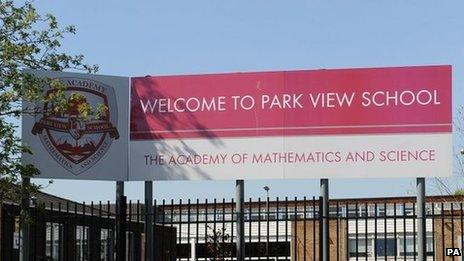
Park View Academy was one of the schools placed in special measures by Ofsted
What are the main proposals?
Mr Gove said the government would require all schools to "promote British values" and would back Ofsted's plan to introduce no-notice school inspections in England.
The chief inspector, Sir Michael Wilshaw, recommended:
mandatory training for school governors
changes to funding agreements for academies and free schools
an end to the exemption of free schools and academies from the national curriculum
What will happen to the five schools in special measures?
In his speech to the House of Commons, Mr Gove said the need for action was "urgent".

Michael Gove says no pupil should be exposed to extremist views
"Academies will receive letters saying I am minded to terminate funding agreements," he told MPs.
If this goes ahead, it would mean that Park View Education Trust, which runs Park View and two primary schools, would no longer receive funding to run the schools.
The same will apply to Oldknow Academy.
A Department for Education spokesman said this would be the first time this had happened.
The DfE is awaiting a response from the trust and would have to find new sponsors for the three schools.
Mr Gove said the governors at local authority run Saltley School would be replaced.
The Department for Education said Birmingham City Council had already started the process of imposing an interim executive board at Saltley.
A sixth school, local authority run Alston Primary which has been in special measures since May, is already in the process of being turned into an academy "under a strong sponsor", said the DfE.
How does the government define British values?
The prime minister defined British values as "freedom, tolerance, respect for the rule of law, belief in personal and social responsibility and respect for British institutions".
David Cameron said he hoped these values would be inculcated in any school in Britain "whether it was a private school, state school, faith-based school, free school, academy or anything else".
The Department for Education added: "We want to create and enforce a clear and rigorous expectation on all schools to promote the fundamental British values of democracy, the rule of law, individual liberty and mutual respect and tolerance of those with different faiths and beliefs."
How will British values be applied to all schools?
The Department for Education says the Independent School Standards, which apply to private schools, academies and free schools, already require schools to "respect" British values.
It plans to consult shortly on tighter wording that will require schools to actively "promote" British values.
From September the Ofsted framework will be changed to extend this requirement to all state schools, not just academies.
The DfE says it is working with Ofsted on how inspectors will assess the new requirement. Ofsted will also update its training and guidance of inspectors.
Advice to school governors and local authorities will also be updated to reflect the new requirement.
School governors will be expected to play a role "in setting and securing an appropriate ethos and monitoring practice" in schools, says the DfE.
The DfE will also update its advice to local authorities on intervening in schools causing concern.
How might governors' training change?
Training for governors is currently optional. It can be provided by local authorities or by the National College of Teaching and Leadership. The Department for Education and the National Governors' Association (NGA) have both produced handbooks.
The NGA says training is essential to help governors understand their complex and challenging role and responsibilities.
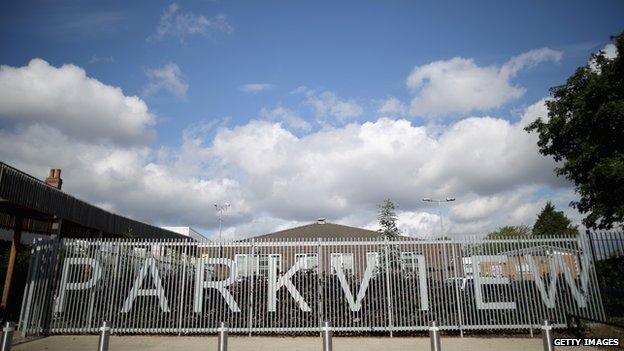
Park View Academy is challenging Ofsted's damning verdict on the school
Governors are expected to develop the ethos of the school, hold the head teacher to account and have financial oversight.
Governors should be committed to asking challenging questions, should develop good relationships based on trust and should know their school, its staff, pupils and local community.
The NGA says the academies programme has brought more autonomy to schools so governing boards have more responsibility than ever and need training.
"It is vital that governors know what is expected of them," it says.
The government says it will respond to Ofsted's recommendation on governor training "in due course".
THe DfE spokesman says training is the responsibility of governing bodies and they should "set an ethos of professionalism", including an expectation that governors undertake training "to fill any gaps" in skills needed for effective governance.
"If a governor fails persistently to do this, then they will be in breach of the code of conduct and may bring the governing body or the office of a governor into disrepute - and as such provide grounds for the governing body to consider suspension," said a spokesman.
How could the oversight of academies change?
Traditionally, local authorities have had a role in monitoring standards in the schools they control, acting as a "middle tier" between schools and the Department for Education.
Now more than half of secondary schools are academies, funded directly by central government, free of local authority control and able to decide their own curriculum.
Concerns have been expressed about the viability of Whitehall monitoring thousands of academies. The government is introducing regional schools commissioners and Head Teacher Boards to improve oversight of academies, while Labour proposes a network of regional school standards directors.
Academy chains, which control several schools, are currently inspected by the Department for Education. Sir Michael Wilshaw argues that Ofsted, which already inspects academy schools, should take over the role.
What was the Trojan Horse letter?
In March, an anonymous letter was made public that claimed to be a template illustrating how state schools could be taken over and pushed into adopting a more Islamic culture.
The document - now thought to be a hoax - proposed a campaign of installing governors and undermining and then replacing school leaders with staff who would be more sympathetic to their religious agenda.
It refers to "Operation Trojan Horse" as the name of the alleged conspiracy. This classical allusion refers to using a device to get past the defences and to take over the school system from within.
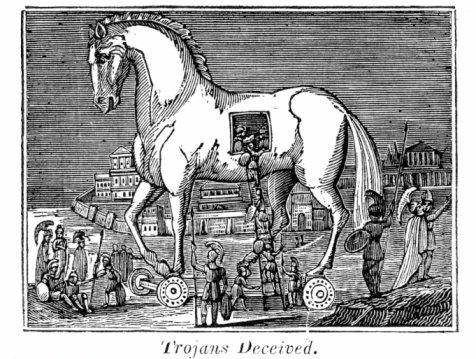
It was apparently intended for schools serving areas with a large Muslim population.
The tactics it proposed had already been used in Birmingham, the Operation Trojan Horse letter claimed.
It emerged that Birmingham City Council, the Department for Education's Extremist Unit, the West Midlands Police Counter-Terrorism Unit and the National Association of Head Teachers were already aware of the letter.
A former head teacher at a Birmingham school said that such religiously-motivated, concerted attempts at forcing out heads had been taking place since the 1990s. Another head teacher said he had told the DfE about the problem in 2010.
What are the claims?
There have been claims that boys and girls are being taught separately, assemblies have put forward extremist Islamist views and that a culture is created in which other religions are downgraded. Schools have rejected claims of extremism.
There are also claims that teachers and head teachers have been discredited and undermined.
How seriously are claims of takeover plots being taken?
Michael Gove appointed former counter-terror chief, Peter Clarke, to investigate "the background behind many of the broader allegations in the Trojan Horse letter" for the DfE.
Mr Gove says he expects to publish these findings in July.
This appointment has created a controversy of its own, with the chief constable of West Midlands police calling it "desperately unfortunate" as people could draw "unwarranted conclusions" from Mr Clarke's former role in counter terrorism.
Ofsted chief Sir Michael Wilshaw took personal charge of the education watchdog's investigations.
Khalid Mahmood, MP for Perry Barr, believes there are reasons to be concerned. "All the information I'm getting... is there has been a serious bid to take over most of the schools in the east and south of the city," he said.
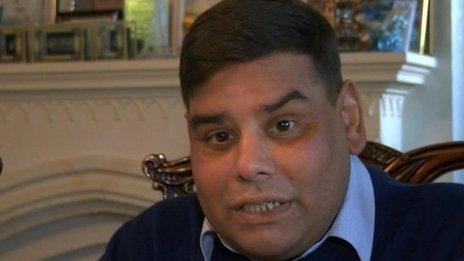
Local MP Khalid Mahmood shares concerns about schools being targeted
The National Association of Head Teachers says it takes the claims "extremely seriously".
Reaction to the claims and to Ofsted's findings from the schools has been robust. The chairman of one governing body described the inquiries as a "witch hunt" and Park View says it plans to challenge Ofsted's verdict.
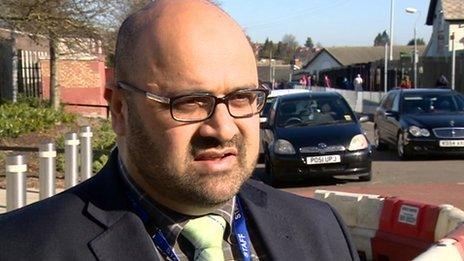
Tahir Alam, chair of governors at Park View School, says claims are "ridiculous"
How are the claims being investigated?
Including Ofsted's, there are four investigations - carried out by Birmingham City Council, the DfE and the Education Funding Agency.
Ofsted said this was "new territory" - when it launched its biggest ever co-ordinated set of inspections over fears of extremism. It inspected 21 schools - a mix of primary, secondary, local authority and academies.

Ofsted has carried out inspections in 18 schools
They carried out unannounced inspections of a type which focuses on a single concern, rather than the overall quality of teaching and learning.
When inspectors do not like what they find they have wide-ranging powers to intervene and order a change of direction.
The city council says that it is investigating 25 schools - prompted by more than 200 contacts from the public. An adviser has been appointed and there will be a review group of MPs, councillors, teachers' organisations, police and faith leaders.
There is a freeze on recruiting new school governors while this inquiry is taking place.
But the politics of education have also become involved, with the council saying it is frustrated that it cannot investigate academies which operate outside of local authority control.
The Education Funding Agency can investigate the financial arrangements of academies.
How did Home Secretary Theresa May become involved?
In a letter to the Education Secretary, Mrs May has raised concerns about the DfE's handling of the allegations of extremism.
She said concerns had been raised about the "inability" of local and central government to tackle the alleged problem in Birmingham's schools.
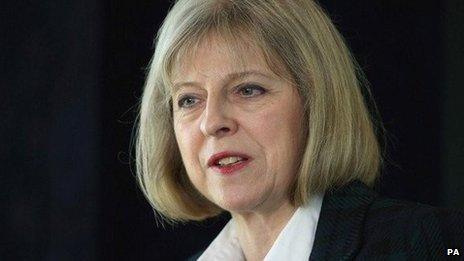
Mrs May said the allegations raised serious questions about the quality of governance
She also questioned whether Mr Gove's department was warned about the allegations in 2010 and asked: "If so, why did nobody act?"
The two senior Cabinet members have now moved to dampen down speculation of a rift. They have taken the unusual step of issuing a joint statement insisting they are "working together" on the issue.
Commentators are seeing the row as two Conservative heavy-weights jostling for position should there be any change to the party's leadership.
How widespread is this problem?
The biggest inquiry so far is the council's, which is looking at 25 schools in Birmingham, out of more than 400 in the city. The council says that it will also be talking to local authorities in Bradford and Manchester.